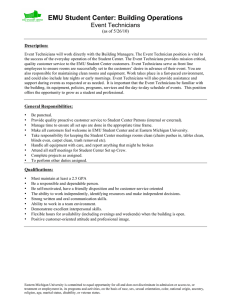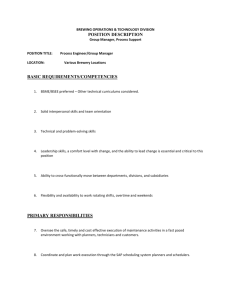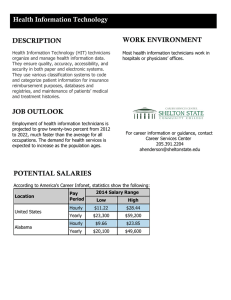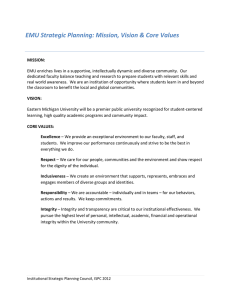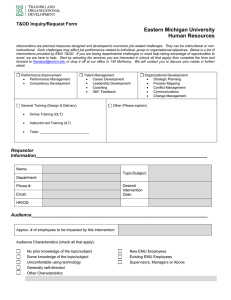In order to apply at the Campus Life Front Desk... Campus Life is part of the Center for Student Involvement....
advertisement
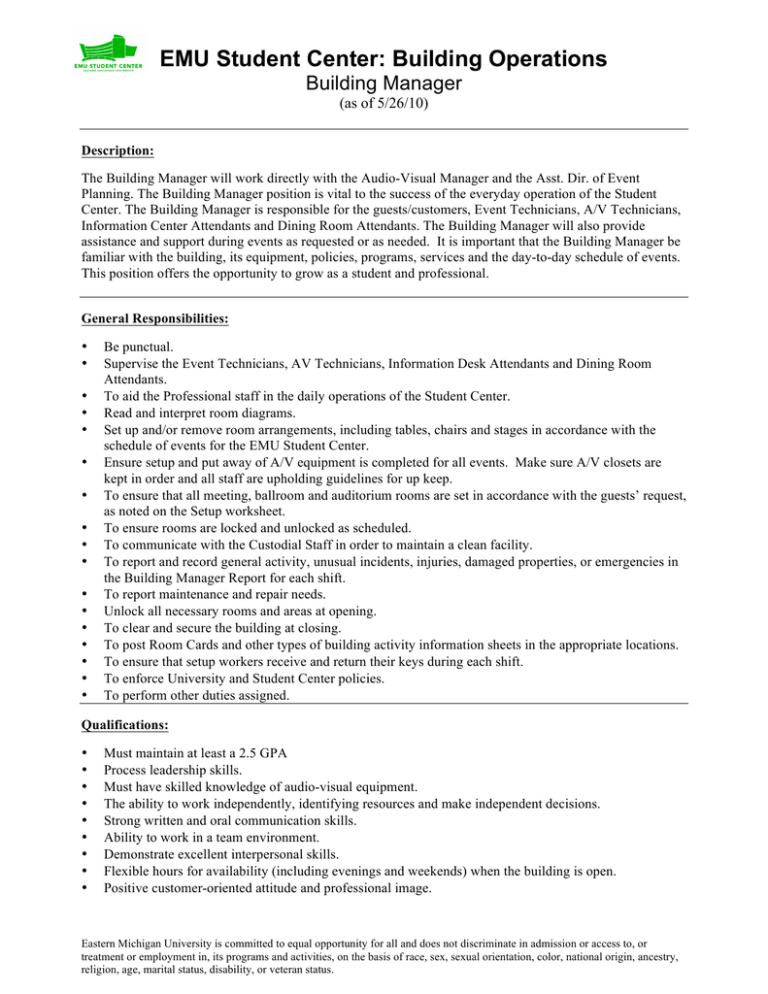
EMU Student Center: Building Operations Building Manager (as of 5/26/10) Description: The Building Manager will work directly with the Audio-Visual Manager and the Asst. Dir. of Event Planning. The Building Manager position is vital to the success of the everyday operation of the Student Center. The Building Manager is responsible for the guests/customers, Event Technicians, A/V Technicians, Information Center Attendants and Dining Room Attendants. The Building Manager will also provide assistance and support during events as requested or as needed. It is important that the Building Manager be familiar with the building, its equipment, policies, programs, services and the day-to-day schedule of events. This position offers the opportunity to grow as a student and professional. General Responsibilities: • • • • • • • • • • • • • • • • • Be punctual. Supervise the Event Technicians, AV Technicians, Information Desk Attendants and Dining Room Attendants. To aid the Professional staff in the daily operations of the Student Center. Read and interpret room diagrams. Set up and/or remove room arrangements, including tables, chairs and stages in accordance with the schedule of events for the EMU Student Center. Ensure setup and put away of A/V equipment is completed for all events. Make sure A/V closets are kept in order and all staff are upholding guidelines for up keep. To ensure that all meeting, ballroom and auditorium rooms are set in accordance with the guests’ request, as noted on the Setup worksheet. To ensure rooms are locked and unlocked as scheduled. To communicate with the Custodial Staff in order to maintain a clean facility. To report and record general activity, unusual incidents, injuries, damaged properties, or emergencies in the Building Manager Report for each shift. To report maintenance and repair needs. Unlock all necessary rooms and areas at opening. To clear and secure the building at closing. To post Room Cards and other types of building activity information sheets in the appropriate locations. To ensure that setup workers receive and return their keys during each shift. To enforce University and Student Center policies. To perform other duties assigned. Qualifications: • • • • • • • • • Must maintain at least a 2.5 GPA Process leadership skills. Must have skilled knowledge of audio-visual equipment. The ability to work independently, identifying resources and make independent decisions. Strong written and oral communication skills. Ability to work in a team environment. Demonstrate excellent interpersonal skills. Flexible hours for availability (including evenings and weekends) when the building is open. Positive customer-oriented attitude and professional image. Eastern Michigan University is committed to equal opportunity for all and does not discriminate in admission or access to, or treatment or employment in, its programs and activities, on the basis of race, sex, sexual orientation, color, national origin, ancestry, religion, age, marital status, disability, or veteran status. EMU Student Center: Building Operations Building Manager (as of 5/26/10) Transferable Skills: Transferable skills are those abilities that can be useful in many different settings. They can make you qualified to enter into many different fields even though you may not have specific education or experience in that area. Your position will allow you to progressively develop a variety of skills in a supportive environment where you can improve upon your weaker abilities, monopolize on your strengths, learn from your mistakes, and create your own personal character in the work setting. The following list identifies only some of the skills that you will develop during your time working with us. The list is not all-inclusive. Leadership - the ability to motivate others, develop and implement programs, delegate responsibility, and lead by example. Communication - the ability to listen to others objectively, paraphrase the content of the message, speak effectively, use various forms of written communication through written reports, etc. Planning and Organization - the ability to identify alternative courses of action, accommodate multiple demands and requests, prioritize, establish goals and follow through on fulfilling these goals, manage time effectively, and predict future trends and patterns. Event Planning - the ability to effectively plan programs, understanding what it takes to coordinate a successful event. Informational Management Skills - the ability to problem solve, sort data and objects, compile and rank information, apply information creatively to problems or tasks, synthesize facts, concepts and principles, understand and use organizing principles, evaluate information against appropriate standards. Critical Thinking Skills - the ability to identify quickly and accurately the critical issues when making a decision or solving a problem, identify problems and needs, identify information sources appropriate to a problem or need, and formulate questions to clarify a problem. Valuing Skills - the ability to assess a course of action in terms of its long-range effects on the general human welfare, make decisions that will maximize both individual and collective good, and the ability to use ethical thinking and decision-making when solving issues. Management and Administrative Skills - the ability to analyze tasks, identify people and resources useful to the solution of a problem, delegate responsibility, manage time effectively, and successfully complete the formal training needed to do a job well. Interpersonal and Human Relations Skills - the ability to interact effectively with peers, colleagues and supervisors, the ability to work well in a group, express feelings appropriately, understand the feelings of others, contribute in staff meetings, and share in staff responsibilities. Eastern Michigan University is committed to equal opportunity for all and does not discriminate in admission or access to, or treatment or employment in, its programs and activities, on the basis of race, sex, sexual orientation, color, national origin, ancestry, religion, age, marital status, disability, or veteran status.
